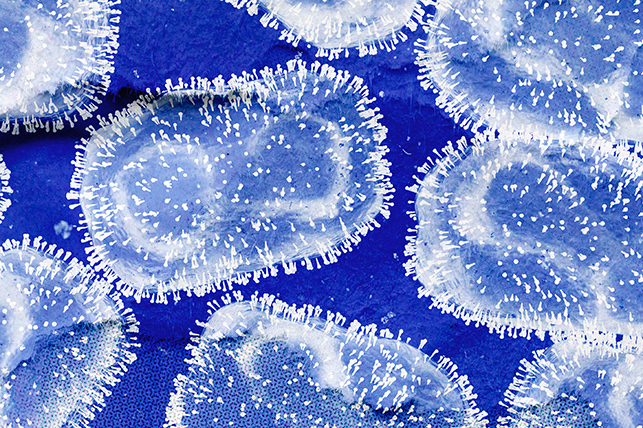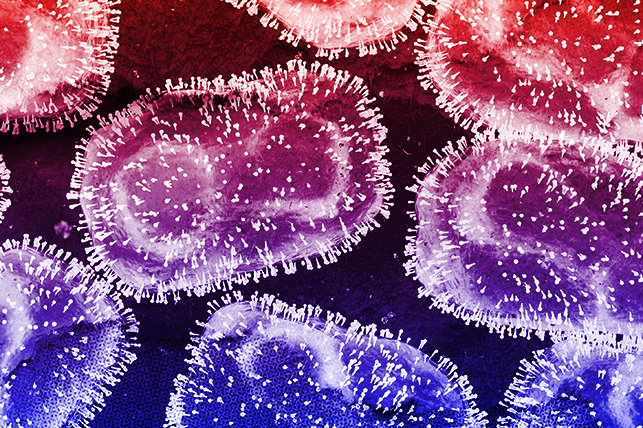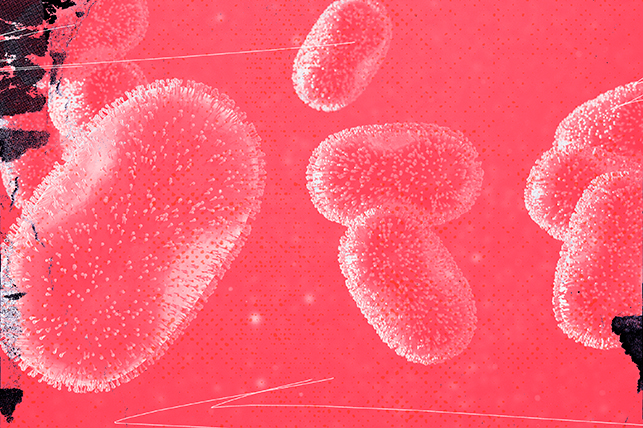Monkeypox: How We Got Here and Why the Name Had to Change

In mid-May 2022, still in the thick of the COVID-19 pandemic, another virus arrived on the scene in Massachusetts: monkeypox. The vaccine to cure the condition was accessible, but the coronavirus was the overwhelming priority for millions of lives in the United States.
Another pandemic sounded like too much to bear, and questions were raised by media already primed to get in on the action. How do you catch monkeypox? Will it be as bad as COVID-19? What's with the name?
Transmission of the virus can happen through physical contact during anal, oral and vaginal sex. Complications of monkeypox have included confusion, eye issues and pneumonia, as well as proctitis, which causes painful sores and swelling inside the rectum. The virus can be transmitted to the fetus during pregnancy or to a newborn during and after birth. Cases of spontaneous pregnancy loss and stillbirth have been recorded in some cases of confirmed pox infection.
The United States has the highest reported number of monkeypox cases in the world. As of Feb. 1, 2023, the total number of cases reported was 30,193. At this point, 32 deaths have been reported.
As for the name, "monkeypox" was changed to "mpox" in November 2022 at the recommendation of the World Health Organization (WHO) and the U.S. Health and Human Services Department.
Where did it come from?
Monkeypox, it turned out, was not another boogeyman stepping out of the shadows. It was first discovered 65 years ago, and it can be managed and prevented.
Brittany Kmush, Ph.D., associate professor of public health at Syracuse University in New York, contextualized the condition within a family of better-known viruses.
"Mpox is an orthopoxvirus, that is, it is a DNA virus that's related to the virus that causes smallpox," she explained.
Manoj Gandhi, M.D., Ph.D., senior medical director of Thermo Fisher Scientific in San Francisco, provided a more narrative explanation.
"The exact origin of monkeypox is not known," he said. "It was first discovered in monkeys in Africa in 1958, and the first human case of monkeypox was recorded in 1970 in [the Democratic Republic of] Congo. The first monkeypox outbreak outside of Africa was in the United States of America in 2003 due to infected pet prairie dogs who were in contact with Gambian pouched rats. The latest 2022 outbreak has been linked to a British resident who had traveled to Nigeria [and] who developed a rash while in Nigeria and returned to the United Kingdom."
Suraj Saggar, D.O., chief of infectious disease at Holy Name Medical Center in Teaneck, New Jersey, offered a slightly different origin story.
"[Mpox] was first isolated in Denmark in the late 1950s from [a] colony of laboratory monkeys from Singapore, and first identified as a cause of disease in humans in the 1970s in the Democratic Republic of Congo," Saggar said. "Humans and monkeys are 'incidental hosts,' [and the] reservoir is likely rodents."
How is mpox spread?
Saggar identified a major contributing factor toward this most recent wave of mpox: men who have sex with men (MSM).
"MSM population definition is strictly behavioral," he explained. "The impact on sexual health for the immunocompromised in particular can cause more severe disease, including proctitis and neurological complications. For most people, it is a self-limited illness."
There's a not-so-fine line between understanding the origins of an illness and cultivating prejudice.
"Monkeypox can spread through extended, close physical contact with [any] infected person," Gandhi said. "Due to this mode of spread, most of the transmission is through sexual contact. Therefore, monkeypox has been also referred to as 'sexually transmissible' rather than being referred to as a sexually transmitted infection. While most of the current monkeypox cases have involved men who have sex with men, it is also not a disease that is specific to the LGBTQIA+ community."
Brian Labus, Ph.D., M.P.H., assistant professor of epidemiology at the University of Nevada, Las Vegas, differentiated mpox from the COVID-19 pandemic of the past few years.
"Mpox does not spread the same way as COVID and it takes much longer to develop the disease, so it cannot spread in a population as easily," he explained. "Unlike COVID, which can spread through asymptomatic people, mpox typically causes clinical disease."
This is very good news. Mpox is certainly an important medical issue, but inherently, the virus isn't as perfectly adapted for an international crisis as COVID-19 had been.
In addition to MSM being a high-risk group, Saggar noted there are situations to avoid in areas with high rates of mpox, such as group sex, raves, movie halls, saunas and other group settings. He added that mpox rashes can mimic those of chicken pox, smallpox and sexually transmitted infections (STIs).
Risk management is still an important undertaking with mpox, so you should use your best judgment and concern for the well-being of others to guide you through tough choices.
By the numbers
"Over 95 percent of the cases in the United States have been in men and 70 percent of those people report recent male-to-male sexual contact," Labus noted. "Black and Hispanic men have been disproportionately infected, and over half the mpox patients are HIV positive."
Gandhi boiled down the current recommendations from the Centers for Disease Control and Prevention (CDC), which include a five-step approach to prevent infection by mpox:
- Avoid close, skin-to-skin contact with people who have a rash that looks like mpox.
- Avoid contact with objects and materials that a person with mpox has used.
- Wash your hands often.
- Get vaccinated.
- Avoid contact with animals that can spread mpox virus, usually rodents and primates in Central or West Africa.
Why the name change?
Assigning names to diseases is the responsibility of the World Health Organization, Gandhi explained.
"It was called monkeypox because it was first discovered in monkeys and the disease it causes results in pox: blisters that become pus-filled and leave pockmarks upon healing. Hence, the name monkeypox," Gandhi said. "Since the outbreak, there were several instances of racist and stigmatizing language which was reported to the WHO. After consultation from various experts from 45 countries, the decision was taken to change the name from monkeypox to mpox. Mpox is now the preferred terminology and will replace the term monkeypox after a transition period of one year."
Kmush added that the name monkeypox isn't just open to prejudiced interpretations, it's also inaccurate.
"Monkeys are not the main source of infection," she said. "Additionally, the name monkeypox is linked to racist stereotypes and leads to further stigma about the disease. Therefore, the name has been changed to mpox. In the most recent outbreak, there is evidence that mpox can be transmitted from sexual contact. However, mpox is more often transmitted from contact with broken skin, the respiratory tract, the eyes, nose and mouth."
The fear a pandemic inspires makes people hungry for certainty, so unfair connections are sometimes made too quickly. Knowledge and understanding of the disease is the best tool we have to prevent and deconstruct these irrational conclusions.


















